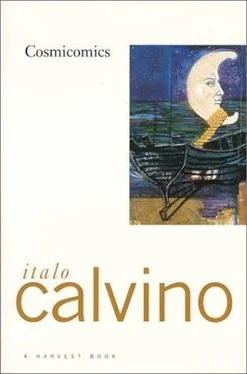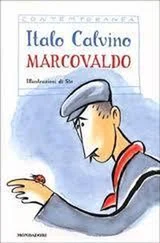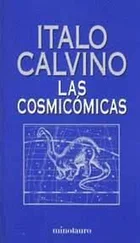I still haven't told you everything, about the things my cousin was good at. That job of extracting lunar milk from the Moon's scales was child's play to him: instead of the spoon, at times he had only to thrust his bare hand under the scales, or even one finger. He didn't proceed in any orderly way, but went to isolated places, jumping from one to the other, as if he were playing tricks on the Moon, surprising her, or perhaps tickling her. And wherever he put his hand, the milk spurted out as if from a nanny goat's teats. So the rest of us had only to follow him and collect with our spoons the substance that he was pressing out, first here, then there, but always as if by chance, since the Deaf One's movements seemed to have no clear, practical sense.
There were places, for example, that he touched merely for the fun of touching them: gaps between two scales, naked and tender folds of lunar flesh. At times my cousin pressed not only his fingers but – in a carefully gauged leap – his big toe (he climbed onto the Moon barefoot) and this seemed to be the height of amusement for him, if we could judge by the chirping sounds that came from his throat as he went on leaping.
The soil of the Moon was not uniformly scaly, but revealed irregular bare patches of pale, slippery clay. These soft areas inspired the Deaf One to turn somersaults or to fly almost like a bird, as if he wanted to impress his whole body into the Moon's pulp. As he ventured farther in this way, we lost sight of him at one point. On the Moon there were vast areas we had never had any reason or curiosity to explore, and that was where my cousin vanished; I had suspected that all those somersaults and nudges he indulged in before our eyes were only a preparation, a prelude to something secret meant to take place in the hidden zones.
We fell into a special mood on those nights off the Zinc Cliffs: gay, but with a touch of suspense, as if inside our skulls, instead of the brain, we felt a fish, floating, attracted by the Moon. And so we navigated, playing and singing. The Captain's wife played the harp; she had very long arms, silvery as eels on those nights, and armpits as dark and mysterious as sea urchins; and the sound of the harp was sweet and piercing, so sweet and piercing it was almost unbearable, and we were forced to let out long cries, not so much to accompany the music as to protect our hearing from it
Transparent medusas rose to the sea's surface, throbbed there a moment, then flew off, swaying toward the Moon. Little Xlthlx amused herself by catching them in midair, though it wasn't easy. Once, as she stretched her little arms out to catch one, she jumped up slightly and was also set free. Thin as she was, she was an ounce or two short of the weight necessary for the Earth's gravity to overcome the Moon's attraction and bring her back: so she flew up among the medusas, suspended over the sea. She took fright, cried, then laughed and started playing, catching shellfish and minnows as they flew, sticking some into her mouth and chewing them. We rowed hard, to keep up with the child: the Moon ran off in her ellipse, dragging that swarm of marine fauna through the sky, and a train of long, entwined seaweeds, and Xlthlx hanging there in the midst. Her two wispy braids seemed to be flying on their own, outstretched toward the Moon; but all the while she kept wriggling and kicking at the air, as if she wanted to fight that influence, and her socks – she had lost her shoes in the flight – slipped off her feet and swayed, attracted by the Earth's force. On the ladder, we tried to grab them.
The idea of eating the little animals in the air had been a good one; the more weight Xlthlx gained, the more she sank toward the Earth; in fact, since among those hovering bodies hers was the largest, mollusks and seaweeds and plankton began to gravitate about her, and soon the child was covered with siliceous little shells, chitinous carapaces, and fibers of sea plants. And the farther she vanished into that tangle, the more she was freed of the Moon's influence, until she grazed the surface of the water and sank into the sea.
We rowed quickly, to pull her out and save her: her body had remained magnetized, and we had to work hard to scrape off all the things encrusted on her. Tender corals were wound about her head, and every time we ran the comb through her hair there was a shower of crayfish and sardines; her eyes were sealed shut by limpets clinging to the lids with their suckers; squids' tentacles were coiled around her arms and her neck; and her little dress now seemed woven only of weeds and sponges. We got the worst of it off her, but for weeks afterwards she went on pulling out fins and shells, and her skin, dotted with little diatoms, remained affected forever, looking – to someone who didn't observe her carefully – as if it were faintly dusted with freckles.
This should give you an idea of how the influences of Earth and Moon, practically equal, fought over the space between them. I'll tell you something else: a body that descended to the Earth from the satellite was still charged for a while with lunar force and rejected the attraction of our world. Even I, big and heavy as I was: every time I had been up there, I took a while to get used to the Earth's up and its down, and the others would have to grab my arms and hold me, clinging in a bunch in the swaying boat while I still had my head hanging and my legs stretching up toward the sky.
"Hold on! Hold on to us!" they shouted at me, and in all that groping, sometimes I ended up by seizing one of Mrs. Vhd Vhd's breasts, which were round and firm, and the contact was good and secure and had an attraction as strong as the Moon's or even stronger, especially if I managed, as I plunged down, to put my other arm around her hips, and with this I passed back into our world and fell with a thud into the bottom of the boat, where Captain Vhd Vhd brought me around, throwing a bucket of water in my face.
This is how the story of my love for the Captain's wife began, and my suffering. Because it didn't take me long to realize whom the lady kept looking at insistently: when my cousin's hands clasped the satellite, I watched Mrs. Vhd Vhd, and in her eyes I could read the thoughts that the deaf man's familiarity with the Moon were arousing in her; and when he disappeared in his mysterious lunar explorations, I saw her become restless, as if on pins and needles, and then it was all clear to me, how Mrs. Vhd Vhd was becoming jealous of the Moon and I was jealous of my cousin. Her eyes were made of diamonds, Mrs. Vhd Vhd's; they flared when she looked at the Moon, almost challengingly, as if she were saying: "You shan't have him!" And I felt like an outsider.
The one who least understood all of this was my deaf cousin. When we helped him down, pulling him – as I explained to you – by his legs, Mrs. Vhd Vhd lost all her self-control, doing everything she could to take his weight against her own body, folding her long silvery arms around him; I felt a pang in my heart (the times I clung to her, her body was soft and kind, but not thrust forward, the way it was with my cousin), while he was indifferent, still lost in his lunar bliss.
I looked at the Captain, wondering if he also noticed his wife's behavior; but there was never a trace of any expression on that face of his, eaten by brine, marked with tarry wrinkles. Since the Deaf One was always the last to break away from the Moon, his return was the signal for the boats to move off. Then, with an unusually polite gesture, Vhd Vhd picked up the harp from the bottom of the boat and handed it to his wife. She was obliged to take it and play a few notes. Nothing could separate her more from the Deaf One than the sound of the harp. I took to singing in a low voice that sad song that goes: "Every shiny fish is floating, floating; and every dark fish is at the bottom, at the bottom of the sea…" and all the others, except my cousin, echoed my words.
Читать дальше












